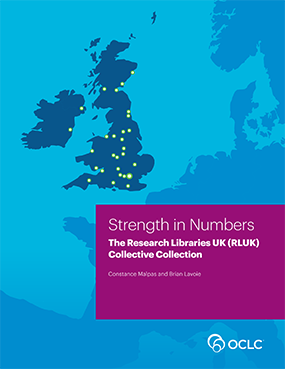Strength in Numbers: The Research Libraries UK (RLUK) Collective Collection
by Constance Malpas and Brian Lavoie
#oclcresearch
Highlights:
- Research libraries benefit from the ability to consider their local collections as part of a broader collective collection: the combined collections of a group of institutions, such as an academic consortium.
- The RLUK collective collection encompasses 29.4 million distinct publications of all types, including 20.9 million distinct print book publications.
- Print books in RLUK member collections reflect a rich global diversity, with 467 languages and 254 countries of publication represented.
- Books (all formats) comprise the largest segment of the RLUK collective collection, presenting a significant opportunity for re-imagining library services to both maximize the value of the aggregate resource as a shared asset and improve efficiency in local library operations.
- Rareness is common in the RLUK collective collection, with relatively small levels of overlap across RLUK member collections adding scope and depth to the collective resource.
- Nearly 460,000 distinct subjects are associated with the print book publications in the RLUK collective collection, with a variety of particular subject strengths distributed across the RLUK membership.
- The collective collection of a group of institutions is rarely subsumed within a subset of member collections. Full coverage of the collective collection requires full in-group participation in the stewardship effort.
- The RLUK collective collection is both similar to and distinct from the collective collection of the Association of Research Libraries (ARL): for example, a significant portion (42 percent) of the RLUK print book collection overlaps with the ARL collection, but an even larger portion (58 percent) does not.
- A key question in managing collections as a shared resource is whether the planning perspective should be restricted to group membership only, or if it should be elevated to higher scales, recognizing that the group collective collection is embedded in a broader system of collective collections.
Abstract:
Research libraries are exploring opportunities to cooperatively address areas of mutual need, including collection management and the long-term stewardship of the legacy print investment. Analysis of collective collections is a valuable source of insight and intelligence to support planning in an environment where libraries seek to create value through collective action and shared capacities. In partnership with Research Libraries UK (RLUK), OCLC Research has produced a detailed characterization of the collective collection of the RLUK membership, with special emphasis on print books. This report examines the size, scope, and overlap patterns of the RLUK collective collection, supplemented with additional perspective from comparison to the Association of Research Libraries (ARL) collective collection and the global library system as a whole. This study is of particular interest to the RLUK membership, but is also relevant to any group of higher education institutions engaged in, or planning, cooperative efforts around their collections.
Suggested citation:
Malpas, Constance, and Brian Lavoie. 2016. Strength in Numbers: The Research Libraries UK (RLUK) Collective Collection. Dublin, Ohio: OCLC Research. https://doi.org/10.25333/C3N33J.
Resources
- Learn more about our Understanding the System-wide Library work.
